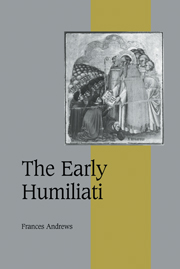Book contents
- Frontmatter
- Contents
- Acknowledgements
- List of abbreviations
- Map
- Introduction
- 1 Tradition and history
- 2 The beginnings of the Humiliati: the twelfth-century evidence
- 3 Quia in nullo peccabant: the inspection and approval of the Humiliati 1199–1201
- 4 Rules
- 5 In search of communities
- 6 New members and profession of vows
- 7 Unity and uniformity: the development of a centralised order
- 8 The Humiliati and the Church in the localities
- Conclusion
- Appendices
- Bibliography
- Index
- Cambridge Studies in Medieval Life and Thought: Fourth Series
2 - The beginnings of the Humiliati: the twelfth-century evidence
Published online by Cambridge University Press: 02 November 2009
- Frontmatter
- Contents
- Acknowledgements
- List of abbreviations
- Map
- Introduction
- 1 Tradition and history
- 2 The beginnings of the Humiliati: the twelfth-century evidence
- 3 Quia in nullo peccabant: the inspection and approval of the Humiliati 1199–1201
- 4 Rules
- 5 In search of communities
- 6 New members and profession of vows
- 7 Unity and uniformity: the development of a centralised order
- 8 The Humiliati and the Church in the localities
- Conclusion
- Appendices
- Bibliography
- Index
- Cambridge Studies in Medieval Life and Thought: Fourth Series
Summary
… et pro fide catholica se opponentes …
Universal Chronicle of LaonThe ‘prehistory’ of the Humiliati, before papal approval of the order in 1201, has recently been characterised as a time of fluidity about which little is known and which is difficult to define. This case is made on strong grounds: the sources are extremely sporadic and of varying value, and the picture they convey is often one of transience, both before 1201 and well into the new century. Yet careful examination of the early material, some of which has long been known, but much of which has only recently come to light, does allow us some insight into their early experience. As we shall see, this suggests that while there may have been some confusion about the early identity of the Humiliati, the heretical status of the early movement should not be overemphasised. Many of the communities included a strong clerical element and were much closer to the establishment of the Church than previous accounts have recognised. The impact of condemnation in the 1180s was to make the Humiliati sensitive about the use of the name and is reflected in cautious (but not absolute) silence, not persecution.
BETWEEN ORTHODOXY AND HERESY
The documented period in the wilderness for the Humiliati covers some twenty-five years, from the first references to their activities in the mid-1170s to the procedures leading to papal approval of the order which began in 1199–1200.
- Type
- Chapter
- Information
- The Early Humiliati , pp. 38 - 63Publisher: Cambridge University PressPrint publication year: 2000



